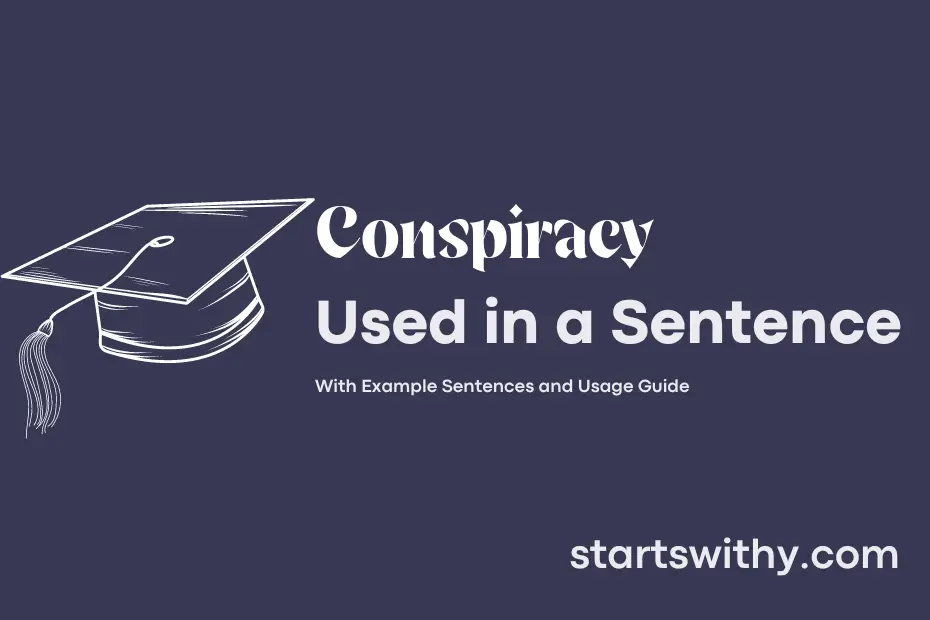Have you ever heard of a conspiracy theory? A conspiracy is a secret plan by a group to do something harmful or illegal. When people believe in a conspiracy theory, they think that a group of powerful people are secretly working together to do something bad.
Conspiracy theories often involve dramatic stories that can be hard to prove. While some conspiracies turn out to be true, many are just wild ideas without real evidence to back them up. In today’s world of social media and misinformation, it’s important to critically evaluate information before believing in any conspiracy theories.
7 Examples Of Conspiracy Used In a Sentence For Kids
- Some people think that aliens are part of a conspiracy.
- The detective solved the mystery behind the conspiracy.
- My friend believes in a conspiracy theory about the moon landing.
- The group of animals had a secret conspiracy to steal the cookies.
- We watched a movie about a conspiracy to take over the world.
- The wizard cast a spell to uncover the conspiracy.
- The pirates had a hidden conspiracy to find the treasure.
14 Sentences with Conspiracy Examples
- Conspiracy theories about the college administration are spreading among students.
- Students suspect a conspiracy to delay exam results.
- Some students believe there’s a conspiracy behind the sudden increase in tuition fees.
- The student committee is investigating a possible conspiracy within the campus.
- There are rumors of a conspiracy involving the recent changes in the academic calendar.
- The professor dismissed the student’s claim of a conspiracy in the grading system.
- Students are discussing a conspiracy theory related to the new course syllabus.
- A group of students is planning to uncover a conspiracy surrounding campus security measures.
- Some students are convinced that there’s a conspiracy to reduce scholarship opportunities.
- The debate club is hosting a discussion on popular conspiracy theories circulating in the college.
- With finals approaching, students are wary of any conspiracy to disrupt the exam schedule.
- The student body is divided over a supposed conspiracy involving the placement cell.
- A student blog has gained popularity for exposing alleged conspiracy theories within the college.
- The upcoming seminar will delve into the psychology behind believing in conspiracy theories.
How To Use Conspiracy in Sentences?
Conspiracy is a noun that refers to a secret plan by a group of people to do something harmful or illegal. When using the word conspiracy in a sentence, it is important to understand its meaning and context.
Here are some examples of how to use conspiracy in a sentence:
- The detectives uncovered a sinister conspiracy to overthrow the government.
- Many people believe that the moon landing was a hoax orchestrated as part of a conspiracy.
- The group of hackers was arrested for their conspiracy to steal classified information.
- She was accused of being involved in a conspiracy to sabotage her colleague’s promotion.
- The documentary explored various conspiracy theories surrounding the assassination of JFK.
When using conspiracy in a sentence, make sure to provide enough context so that the meaning is clear to the reader. It is also important to use the word accurately and in the appropriate context. Avoid using conspiracy as a general term for any kind of secret or illegal activity, as it specifically refers to a group planning harm or breaking the law.
By following these guidelines, you can effectively incorporate conspiracy into your writing or speech to convey the idea of a secret plan aimed at achieving a harmful or illegal goal.
Conclusion
In conclusion, the examples of sentences featuring the keyword “conspiracy” highlight instances where individuals are believed to have engaged in secret plots or schemes to achieve certain objectives, often involving illegal or unethical actions. These sentences showcase a range of contexts, from political intrigue to criminal activities, where conspiracies are suspected or proven to exist. Understanding the implications of these conspiracies is crucial in shedding light on covert operations and potential threats to societal integrity.
By analyzing sentences containing the term “conspiracy,” it becomes evident that conspiratorial behavior can have far-reaching consequences, impacting trust in institutions, relationships between individuals, and the overall stability of society. Recognizing and exposing conspiracies through investigative journalism, legal proceedings, or governmental oversight is essential in upholding transparency and accountability, ensuring the protection of democratic principles and safeguarding against covert manipulation or deception.



